- Home
- Sophie Davis
Talented Page 2
Talented Read online
Page 2
I strode confidently towards the blankets and sat down. I patted a spot on the fabric next to me. Donavon gave me a huge smile and took a seat, folding his long legs underneath him.
“Donavon . . .,” I mentally began, looking at my hands uncomfortably. I did want to spend the night with him out here, under the stars, but I also didn’t want him to get the wrong idea.
He lifted my chin, forcing me to meet his clear blue eyes.
“I know, Tal. No pressure, I just want to spend time with you.” His mental voice was soft.
“Thank you,” I said out loud, giving him an appreciative half-grin. Donavon was only a year older than me, but that year seemed to make all the difference when it came to taking the next step in our relationship.
We both lay down with our heads on the pillows, facing each other. Donavon draped one arm over my small waist, and extended the other one under my head. We stayed like that for the rest of the night. Nobody walking by would have been able to overhear our conversation, even though we talked until just before sun rise. Our entire exchange took place mentally. We rarely spoke “normally” – not since that first summer when we met.
Donavon pulled me in closer, and I buried my face in his broad chest feeling comfortable, and relaxed for the first time since arriving at Elite Headquarters.
I drifted off to sleep as the sky turned from the dark of night to the pink of morning.
Chapter Two
The Great Contamination, as the history books called it, occurred a little over one hundred years ago. It started with natural disasters – earthquakes, tsunamis, hurricanes, and tornados. Those catastrophes destroyed small coastal fishing villages and devastated large industrial nations alike. The above-ground damage was extensive; entire towns were washed away. Millions, world-wide, lost everything, including their lives. Within weeks of the initial string of disasters, the world received another shocking blow. The nuclear reactors buried deep in the Earth’s surface had begun to leak. Originally, the governments of the most powerful nations in the world banded together in an attempt to contain the waste. They called in world-renowned scientists, but nobody could figure out how to prevent the spread of the nuclear material.
In less than one year all of the world’s oceans were officially declared contaminated. The decimation of marine life was just the first step on the path to the destruction of the world’s eco-system. Governments all over the world issued massive health warnings; swimming in the world’s oceans became prohibited, and the remaining sea life and land animals were deemed unsafe to eat.
As if the initial effects of the disasters were not bad enough, several years after the contamination the long-term ramifications became apparent. Any and all animals that survived the spill were rounded up and bred, in an effort to slowly rebuild the populations. But the animals born in captivity weren’t normal. Horses were born with horns, dogs with feathers instead of fur, fish with three eyes and even two headed pigs were reported.
Quickly it became evident that the anomalies weren’t specific to animal life. The change in animals was followed closely by changes in plant life. Leaves began to glow at night, and the bark on trees grew a fuzzy coating, stinging anything that touched it. Even insects began to exhibit changes in color, size, and number of appendages.
However, the most drastic effects of the contamination weren’t observed until the first post-contamination children were born. Most afflicted children were born with unnatural eyes, white blonde hair or an extra finger or toe here and there. A large percentage was also born with a little something extra – something more serious.
As the first post-contamination-era children reached the age of five, parents started to notice that the kids were – in a word – weird. Some parents hid their children’s abnormalities or, as they are now called, Talents. Other adults weren’t able to hide the fact that their child changed in to an animal at-will. It soon became obvious that these Talents were as varied as they were prevalent.
Morphing is the most common Talent. Some children can morph into multiple animals – called polymorphs – while others were limited to only one or two creatures – mono or dimorphs. Telekinesis, telepathy, compulsion, higher reasoning, viewing and visions were also among the first recorded Talents. Eventually light manipulators, electrical manipulators and mental manipulators were also discovered.
Of course, not all children were born with Talents. Many appeared, and acted, just as ordinary as their parents. Scientists studied both types of post-contamination-era children, desperately seeking answers as to why some were born “normal” while others were not. Experts experimented on the kids for years following the spill, but there efforts were to no avail. They were unable to isolate any single gene mutation that would account for the variation. Researchers were baffled. There was only one hypothesis that they could all agree on: The Talented were a direct result of the world’s nuclear contamination.
Some Talents were revered, while others were feared. Visionaries were among those prized. Everybody in the world wanted to believe a better life was on the horizon, and any child who claimed to see a brighter future was placed on a pedestal. On the other hand, telepaths and mental manipulators were among those feared; nobody liked the idea of children who could influence the minds of others.
The contamination levels remained extremely high for several decades after the initial breakdown of the nuclear reactors, so the first few generations of offspring were heavily saturated with Talented children. As time passed, the filtration systems became more advanced and scientists developed chemicals to counteract the effects on the human body, resulting in fewer and fewer children born with a Talent. The rarest Talents petered out early on, while the more common ones still remain over a century later.
Presently, less than a quarter of the population is born with a Talent. While there is no doubt that originally the Talents were a result of the nuclear contamination, today the cause is less certain. Some believe that children born with Talents now are the descendants of the first generation of children born in the post-contamination-era. Others believe that some individuals always possessed abilities, even before the spill, and the genetic irregularities that cause Talents were just enhanced by the nuclear material. Still others believe that it’s all chance, and being Talented is a fluke.
What do I believe? Some days I feel as though I am cursed: cursed with an affliction that cannot be healed; cursed to explore the mundane minds of those surrounding me; cursed to know what people really think about me; cursed to be burdened with other people’s darkest secrets. Other days I believe that I won the genetic lottery because, after all, who wants to be ordinary?
Chapter Three
“It’s rude to stare at people while they’re sleeping,” I slurred drowsily to Donavon, as I dragged myself out of sleep. I still had my eyes closed, but could feel him watching me. I could also feel the warm sun on my face and knew it must be mid-morning. I smiled. I didn’t usually have the luxury of sleeping much past sunrise.
“It’s time to get up sleepyhead,” he teased.
“Shhh. Sleeping,” I shot back, still grinning.
“I snagged some stuff for breakfast, and if you get up now we can eat together before you need to head back for your afternoon practices,” he tempted. He knew the fastest way to wake me up was promise me food.
“Ugggg,” I groaned loudly. Despite waking up with the birds for nearly half of my life, I was definitely not a morning person. I finally opened my eyes, and sure enough Donavon’s face was only inches from mine. His hair was cut short, so even after a night of sleeping outside he looked fresh and unaffected. I had a feeling that I didn’t look quite so good. My thoughts were confirmed when he reached out and gently detangled leaves and twigs from my wild dark curls.
The few female Hunters that I’d met wore their hair short so it was easy to conceal on missions. I’d briefly contemplated cutting my hair short, but when you’re cursed with thick and curly hair, short is not a good look
. Instead, I usually threaded my long brown curls in to a braid that reached halfway down my back.
“How bad is it?” I cringed, not sure I wanted to know the truth.
“You look like an earth goddess,” he joked. I pushed him hard, causing him to fall over on to his back, laughing.
“Feed me please,” I said, still groggy.
I sat up and blinked several times, trying to clear the last vestiges of sleep from my otherwise perfect vision. The late morning light streamed into our makeshift campground through the tops of the surrounding trees. Donavon must have gotten up during the night to stoke the fire because it was still burning strong. He reached into a cooler sitting on the far side of his black-and-red-checkered blanket, and pulled out several containers. The first was a shiny, metal thermos that he placed in the fire to warm. The next contained bright red raspberries. The last plastic container held thick slices of a white, spicy cracked-pepper cheese. Finally, Donavon pulled out a loaf of bread with a crusty brown exterior and a soft white center. He used a Swiss Army knife to cut the bread, and used tongs to place it in the fire for just long enough to warm it. I watched, feeling extremely lazy, as he poured the dark-brown liquid from the thermos into two ceramic cups he pulled from a black canvas bag, and handed one to me. I held it under my nose, inhaling the rich aroma, as the steam pouring off the top warmed my face. He handed me half of the loaf of bread. I took it gratefully and spread several slices of the cheese along the length of the baguette, chewing happily. In between mouthfuls of spicy, cheesy bread, I popped sweet juicy berries.
“Good?” Donavon asked, watching me with an amused smirk. I beamed in return with my mouth closed, trying to keep all the food in.
“It’ll do,” I replied in the most off-hand tone that I could mentally manage. I didn’t want him to be too satisfied with the amazing and delicious breakfast he’d arranged. In truth, mornings like this with Donavon were what I lived for. Sitting here, alone with him, reminded me of when we were children, before life became so complicated.
After we finished eating we packed up our campsite, extinguished the fire, and walked the short distance back to the Hunters’ Village and our respective cabins. We paused when we entered the cluster of small houses. Donavon leaned down and kissed me good bye.
“Have a good day,” he grinned.
“You too.” I was still barefoot so I walked carefully through the grassy area, still checkered with splashes of paint and neon dye from the night before.
I gently opened the door to the cabin I shared with Erik and Henri. Both were, thankfully, still in bed. I glanced longingly toward my empty bed, still a mess of sheets and pillows from the night before when I’d been so rudely awakened. Tip-toeing across the wooden floor towards the bathroom, I silently prayed that the ancient boards wouldn’t creak. I had one hand on the doorknob to the bathroom when I heard a voice from behind me.
“Late night, Talia?” Erik’s tousled black haired head was just visible over the top of his dark green blanket. His turquoise eyes were shining with amusement. The streaks of paint were still on his face.
“None of your business,” I retorted, trying to hide my quickly-reddening cheeks.
“Actually it is my business. We’re a team. You, me, and Henri. Our lives depend on each other, so anything and everything that affects one of us affects all of us,” he lectured me, with mock seriousness.
“You’re still a Pledge, and I’m the leader of this team, so you have to do what I say; and I say you tell us where you were last night,” Henri chimed in. Great, they were both awake. I glared at him.
“You both know exactly where I was,” I squeaked. I sounded like a child getting caught doing something wrong, instead of an adult who had every right to spend the night with her boyfriend, which of course was what I had been going for.
“I wanna hear you say it,” Erik taunted.
“Why?” I demanded.
“So we can see you blush,” Erik laughed. Too late. The heat from my face was already spreading down my neck. Thank God the room was still somewhat dark.
I mentally shoved the bathroom door open and quickly stumbled through, willing it to close shut behind me. The door slammed hard enough to shake the wooden walls of the cabin. I heard Erik and Henri’s laughter even after I turned on the shower water.
I took my time in the bathroom, not wanting to face Erik or Henri sooner than I had to. There weren’t many girls who chose to become Hunters; most favored other divisions of the Toxic Agency after graduating from the McDonough School for the Talented. I had always wondered why, and now I knew. Most girls were too smart to subject themselves to shared living quarters with teenage boys.
When the water finally ran cold, and I had succeeded in removing all the paint, and likely the top layer of my skin, I turned the silvery knobs to their respective off positions and carefully climbed out of the shower. I toweled myself dry and selected a set of standard issue workout clothes, stretchy black pants and a stretchy black tank top, from my designated bathroom drawers.
I used the towel to clear the layer of steam from the small oval mirror over the sink. I closely examined my reflection, searching for traces of the previous night. Mercifully, my boring reflection was the only thing staring back at me. My damp curls looked black instead of brown from the water. My pupils were dilated, so that only a rim of purple was visible between the black center and the white sclera. My normally olive-toned skin was bright red, from the heat of the shower water and my vigorous scrubbing. I tapped my index finger on the pointy, slightly upturned end of my nose, as if that would help to flatten it down a little. I rubbed at the smattering of tiny brown dots that covered the bridge of my nose and my cheekbones; they didn’t go anywhere, assuring me they were all my own freckles and not lingering dirt. Finally, when I couldn’t find any additional ways to prolong my bathroom time, I wrapped the towel around my hair and opened the door into the main room of the cabin.
“Took you long enough,” Erik exclaimed impatiently. “You do realize that we all have to shower, right?”
“I thought you took your weekly shower three days ago,” I shot back.
“I did, but I have a hot lunch date with one of the Brains so I don’t want to smell.” Brain was a kind of slang term for a Higher-Reasoning Talent because their minds analyzed data faster than any computer. Erik wiggled his eyebrows at me, his trademark move, and then lifted his arm and sniffed.
“Charming,” I rolled my eyes.
“Do I smell, Tals? Maybe I don’t need to shower after all,” he asked, walking toward me and putting his armpit in my face.
“Eww, Erik! Honestly, if the girls that line up to go out with you had to spend as much time with you as I do, they would definitely reconsider.”
“No way. Every girl here considers you the luckiest girl alive.” I looked over at Henri and gave him an “is-he-serious?” look. He just shook his head. Erik and Henri had been friends and teammates, for two years I guess he was used to Erik’s bravado.
Erik finally went into the bathroom to take a shower himself, and I sat down on my unmade bed. I counted to ten, and then, as if on cue, Erik screamed my name followed by a long list of expletives; he’d discovered that I’d taken all the hot water. I smiled in satisfaction.
Chapter Four
In the decades following the Great Contamination it became clear to the powers-that-be that the Talented were a new breed of child that posed many potential threats. At global summits, the question of how to deal with these children was the most hotly debated topic. Fear of the unknown drove many nations to demand that the children be locked up “for their own safety;” imprisoning Talents was actually for the peace of mind of scared politicians. Some extremist nations even argued that the eradication of any persons exhibiting paranormal abilities was the only answer to the ever-growing problem. In the end, no satisfactory global solution was reached; instead each country was left to handle the situation in a manner that best served their individual interests.<
br />
Margaret Anne McDonough was the seventy-fifth president of the United States of America and also grandmother to tow-headed, five-year old Daniel McDonough – an exceptionally strong mind manipulator. President McDonough believed that the children born with abilities needed to be nurtured, and taught to use their Talents. She converted a military facility located in western Maryland, previously a presidential bunker, in to a training facility that soon became known as The McDonough School for the Talented.
The McDonough School for the Talented doesn’t only play host to American children. Since many other countries aren’t as forward thinking when it comes to Talents, the School welcomed all gifted kids from anywhere in the world. I, like many of the children there, wasn’t born in the US; I was born in Capri, Italy. Even though my parents, Francis and Katerina Lyons, traveled a lot on account of my father’s position with the government, I called Capri home until their deaths seven years ago.
At first, President McDonough merely offered families the option to send their Talented children to the school. Over time, however it became apparent that some parents were reluctant to have their children attend a special school; they didn’t want the stigma that many associated with having a Talented child. Instead, these parents chose to homeschool their children if they were unable to hide the abnormalities. If they could hide the abilities, these parents sent their kids to normal schools and pretended there was nothing “special” about them.
This ignited a chain reaction. Parents of “normal” children argued that it was unacceptable, because their offspring were at a disadvantage when compared to “Talented” children. These parents claimed that the Talented kids had an unfair edge in every aspect of life, including sports and academics. They argued that the Talented children shouldn’t be allowed to attend schools and play sports with the “normal” ones; it simply wasn’t fair to those born unaffected by the nuclear contamination.

 2446-89
2446-89 Shadow Fate 2: Sacrifice
Shadow Fate 2: Sacrifice Vacant Voices (Blind Barriers Trilogy Book 3)
Vacant Voices (Blind Barriers Trilogy Book 3)![[Blind Barriers 01.0] Fragile Facade Read online](http://i1.bookreadfree.com/10/blind_barriers_01_0_fragile_facade_preview.jpg) [Blind Barriers 01.0] Fragile Facade
[Blind Barriers 01.0] Fragile Facade Hunted (Talented Saga # 3)
Hunted (Talented Saga # 3)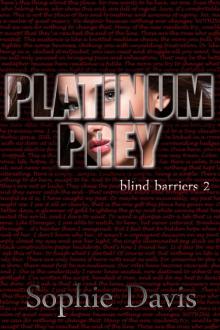 Platinum Prey (Blind Barriers Trilogy #2)
Platinum Prey (Blind Barriers Trilogy #2) Fragile Facade (Blind Barriers Trilogy Book 1)
Fragile Facade (Blind Barriers Trilogy Book 1) Created (Talented Saga)
Created (Talented Saga) The Syndicate (Timewaves Book 1)
The Syndicate (Timewaves Book 1)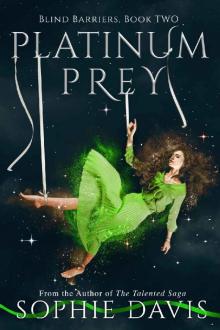 Platinum Prey
Platinum Prey Talented
Talented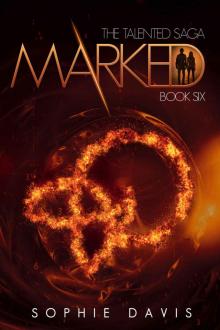 Marked (Talented Saga Book 6)
Marked (Talented Saga Book 6) Unforgettable (Talented Saga #6)
Unforgettable (Talented Saga #6)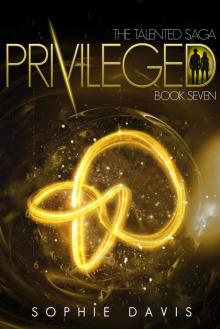 Privileged (Talented Saga Book 7)
Privileged (Talented Saga Book 7)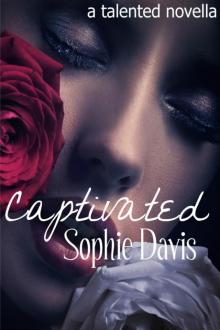 Captivated (Talented Saga #3.5)
Captivated (Talented Saga #3.5) Exiled: Kenly's Story (A Talented Novel)
Exiled: Kenly's Story (A Talented Novel)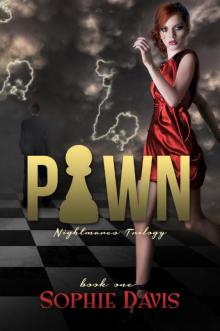 Pawn (Nightmares Trilogy #1)
Pawn (Nightmares Trilogy #1) Exiled_Kenly's Story
Exiled_Kenly's Story Caged (Talented Saga)
Caged (Talented Saga)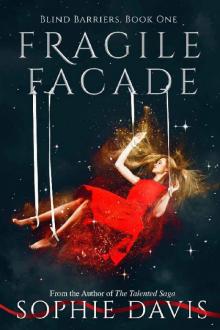 Fragile Facade
Fragile Facade Fated: The Epic Finale (Talented Saga Book 8)
Fated: The Epic Finale (Talented Saga Book 8) Inescapable (Talented Saga #7)
Inescapable (Talented Saga #7)